 Time yet again for the culmination of a year’s worth of metal listening, writing, and audibly opining (on the MSRcast) into the annual year end best of lists! Sometime ago I quietly added a link to the main page of the blog up above called “Recurring Features” that handily compiles all the other previous year end lists together in one place, so be sure to check those out if you haven’t yet. For the past few years, I’ve been splitting up the songs and albums lists, and so in continuing that tradition, I’m eager to present part one of The Metal Pigeon’s Best of 2016 — the songs! These ten songs were culled from a nominees pool of 23 songs this year, and they’re in part isolated gems off flawed albums as well as highlights from the very best albums of the year. I had fun with this list, while agonizing over the albums list (isn’t that always the way?), hope everyone has fun going through it as well!
Time yet again for the culmination of a year’s worth of metal listening, writing, and audibly opining (on the MSRcast) into the annual year end best of lists! Sometime ago I quietly added a link to the main page of the blog up above called “Recurring Features” that handily compiles all the other previous year end lists together in one place, so be sure to check those out if you haven’t yet. For the past few years, I’ve been splitting up the songs and albums lists, and so in continuing that tradition, I’m eager to present part one of The Metal Pigeon’s Best of 2016 — the songs! These ten songs were culled from a nominees pool of 23 songs this year, and they’re in part isolated gems off flawed albums as well as highlights from the very best albums of the year. I had fun with this list, while agonizing over the albums list (isn’t that always the way?), hope everyone has fun going through it as well!
The Metal Pigeon Best Songs of 2016:
1. Avantasia – “A Restless Heart and Obsidian Skies” (from the album Ghostlights)
[youtube https://www.youtube.com/watch?v=raWjIepoxlU&w=560&h=315]
The year’s most surprising artistic comeback success story, Avantasia’s Ghostlights was littered with superb, often stunning songs that were not only expertly written and constructed as only Tobias Sammett could manage, but fun to listen to as well. And at specific moments, they were downright transcendent —- the case in point, the Bob Catley led heart string tugging “A Restless Heart and Obsidian Skies”, a power ballad that might well be a spiritual sibling to the fan favorite “The Story Ain’t Over” (from the Lost In Space Pt 1 EP). Sammett has a magical rapport with Catley, or more accurately, as a songwriter writing for Catley —- channeling Magnum’s sense of dramatic pomp with his own inherent Jim Steinman-esque way with theatricality. Catley is an apt narrator, his raspy yet melodic vocals able to imbue any lyric with a rock n’ roll inspired joie de vivre and yet an appropriate amount of gravitas. Meanwhile Sammett’s ability to let it soar vocally is still unparalleled in power metal. Sure, he doesn’t have the unlimited range that he did during the late 90s/early 00s, but he understands how to pen lyrics and vocal patterns that provide trajectory and lift on a Steve Perry esque level.
This is an absolute gem of a song, with a chorus so rich and beautiful, so aching with indefinable magic that the first time I heard it whilst driving around, I had to pull over in a nearby parking lot just to get my mind right. I’m not being dramatic either, I can vividly recall that memory and the overwhelming rush of what I can only describe as joyous childhood nostalgia that I felt upon listening to it again, and again, and again. It helped that it was near sunset and with a partially overcast sky overhead, and such a backdrop and musically stirred emotional state mirrored the actual lyrics/title of the song. Sammett’s lyrics are stately and romantic in nature, full of atmospheric imagery and a sense of the narrator’s yearning: “Dark is the night, scarlet the moon / Sacred the light in the haze reflecting within…Be still my restless heart / Obsidian’s the sky / Inward you look as you halt / Be still restless heart —- I’m on my way”. I’ll be the first to admit that its not a perfect song, its verses not quite matching the glory of the refrain resulting in a somewhat see-saw song, but that chorus is so unbelievably perfect, I’m willing to forgive what would ordinarily be a major flaw for lesser songwriters. Here, the verses set the mood, almost tempering our expectations, all before that arcing, soaring, perfect chorus rockets us to sheer happiness.
2. Ihsahn – “Mass Darkness” (from the album Arktis.)
[youtube https://www.youtube.com/watch?v=0VxbJb_Gs8w&w=560&h=315]
Yet another in a long line of 2016 surprises, Ihsahn returned with his sixth and perhaps most accessible solo album since The Adversary with Arktis., an album that owed perhaps more to classic metal song craft (read: riffs n’ hooks) than it did to his post-black metal avant garde experimentation. I enjoyed the album a great deal, some tracks more than others ( the saxophone solo wasn’t so bad this time around!), but I was totally blown away by “Mass Darkness”, an uptempo, three minute long adrenaline rush of arena ready black metal that is miles away from the usual dense and complex songwriting Ihsahn usually engages in. Its the best chorus of his career, featuring a genuine hook built upon guest vocalist Matt Heafy’s (Trivium and noted black metal fanboy) repeated refrain “Give in!… Give in to darkness!”, with lyrics that are some of the most convincingly parent-worrying in ages. What’s really special here is that for all its accessibility, “Mass Darkness” still very much retains Ihsahn’s DNA, heard in unusual guitar effects, counter-intuitive musical patterns, a solo that owes more to Wagner than Tipton, and a sense of dark theatricality that permeates the entire song. Give in indeed.
3. Haken – “Earthrise” (from the album Affinity)
[youtube https://www.youtube.com/watch?v=MnZdtpDd9-A&w=560&h=315]
I was properly introduced to London-based prog-metallers Haken this year through Affinity, having been aware of the band’s name in passing for awhile now. Having no idea or expectations of what to expect, I played through the album and came away more than impressed with the entire affair, especially its prog-metal exploration of 80s influences such as Rush, Toto, and Van Halen. There was one song I kept coming back around to in return trips to the album, and I’d always have to play it first, last, and a few extra times in the middle, and that was the cinematic “Earthrise”. Best described as 90s alternative rock in a prog blender (well, perhaps not the best description…), this is the hookiest track on the album and one of the most uplifting songs I heard in all of 2016. Not quite a power ballad and not quite rockin’ in its tempo, it played somewhere in the middle, built on bouncy rhythms and interlocking synth parts with some excellent, sprightly percussion dancing all throughout. Vocalist Ross Jennings takes a little getting used to (some people don’t enjoy his vocals when he’s not letting it rip from his throat), and you’ll either likely know right away what your tolerance level is for unusual vocalists when you hear him. I enjoyed his earnestness in this song, and wasn’t surprised to see through iTunes statistics that this was my second most played song of 2016.
4. Myrath – “Believer” (from the album Legacy)
[youtube https://www.youtube.com/watch?v=uM1d7C8aOWk&w=560&h=315]
I think we’ve all been bombarded with enough talk about how 2016 was a seemingly downcast and darkened year for society, be it through everyone’s endless lamenting over celebrity deaths, the very understandable grief over terrible tragedies all around the world, and of course, *cough* presidential elections. I’ve been guilty of wallowing in it as well, and though I’ve tried to distance myself a bit from all that stuff, the truth is that 2016 was a bit of a crap year for me personally as well. So in looking back, I’m amused to find that I somewhat subconsciously began favoring very positive or happy or downright euphoric music over dark and grim stuff. Enter Myrath, whose Legacy album was one of the early 2016 releases and whose lead off single “Believer” never really left my rotation for any extended period of time. Euphoric is really the best adjective for this song, a celebratory rush of positivity, which only sounds corny if you’ve never really been in need of it. Its also a perfect microcosm of Myrath’s impressively Middle-Eastern infused take on metal, with sweeping violins playing ethnically informed arrangements in between the band’s epic, ambitious progressive metal. Vocalist Zaher Zorgati has a perfect voice for the band, accented clean vocals to welcome newcomers (his pronunciation of “bandwagon” is certainly interesting), but powerful enough to give his lyrics about “what doesn’t kill you makes you stronger” and throwing away yesterday a real sense of belief and passion. The music video (linked above) was kickstarter-ed, and while the song is better off without it, we can’t begrudge them some Prince of Persia fanboying, as tempting as it may be to say something…
5. Hatebreed – “A.D.” (from the album The Concrete Confessional)
[youtube https://www.youtube.com/watch?v=qCgozwhkV-g&w=560&h=315]
Hitting with the force of a gut punch, or perhaps that black and white footage of the cannon ball slamming into the fat guy’s stomach, Hatebreed’s “A.D.” was my go-to during a year when I was frequently in the mood for something raging and snarlingly angry. More than any other band, this was the sound of rage incarnate, and its one of the catchiest and heaviest songs of 2016, at times owing more to thrash metal ala post-1990 Slayer than anything hardcore related. Its lyrics are startlingly open ended despite their specificity, “It’s time to rethink this dream you call American / Corrupt beliefs that some will call their heritage”, a sentiment that could apply to fans around the world in addition to those of us here in the States. Vocalist Jamey Jasta has a precision oriented way with rhythmic syncopation in his lyrics and vocal patterns, just check out the 2:04 mark onwards when he sings “Now hear the media fools discuss the killer’s mind / Staring at the screen to tell us what they find / Manifesto, dollar worship, get on your knees / So they can sell us a cure for the American disease”. That syncopation alone adds that extra teeth gritting power to already sharpened, well written lyrics. The crazy thing about The Concrete Confessional is that it had two other cuts that were in the nominee pool for best songs of the year, a fact that surprised me as much as it likely has you.
6. Serenity – “The Perfect Woman” (from the album Codex Atlanticus)
[youtube https://www.youtube.com/watch?v=RleBiMcx144&w=560&h=315]
Serenity’s first post-Thomas Buchberger album was certainly far from flawless, but it wasn’t the complete disaster that it could have been say for other bands when a key songwriter leaves the lineup. Crucial in this was vocalist Georg Neuhauser’s longtime role as co-songwriter and the primary writer of the vocal lines throughout the Serenity catalog. He shrewdly realized that without Buchberger writing songs built around his Kamelot-ian riffs, songs for Codex Atlanticus would have to be written largely around his vocal melodies first and foremost. But he’s a gifted vocalist, and has an inborn knack for understanding where a melody should go and how it should direct the arrangement of the song, from guitar parts to orchestral arrangements (the Tony Kakko gene in other words). Nowhere was this more evident than on the spectacular Broadway balladry of “The Perfect Woman”, a song ostensibly about Leonardo DaVinci painting The Mona Lisa. I mention Broadway, and yes, this song owes a lot to songwriting for musical theater, taking into account everything from the speed up vocal gymnastics during “I got a sensation that my creation in a quite disturbing way / Has come to life”, while jubilant horns punctuate behind him with musical exclamation marks —- down to the decision to throw in female vocals on the second verse (courtesy of the always on point Amanda Somerville) that serve as a sort of audience chorus in a perspective shift away from Georg’s first person take on Da Vinci’s own thoughts. Its a strange moment but weirdly amusing in its own way, and one I’m glad to have.
7. Purson – “Electric Landlady” (from the album Desire’s Magic Theatre)
[youtube https://www.youtube.com/watch?v=boscR_9EE5Q&w=560&h=315]
Winner of the most clever music/lyric video of 2016 award, metal or otherwise (and let’s be real, calling Purson metal is stretching genre definitions… but they’re here by association), “Electric Landlady” was also the band’s quintessential calling card off Desire’s Magic Theatre, their incense smoke love letter to 60s psychedelic rock. Its a bouncy number, built on nimble guitar lines with a slight crunch (but not too much!) and all the Hammond dressing that psych-rock of this ilk requires wrapped in studio production that is decidedly analog sounding (if there’s anything digital here, its cleverly disguised). I was fortunate enough to see Purson live earlier in late April of 2016 here in Houston towards the beginning of their US tour, which I believe was a mix of supporting shows and solo headliners. We got one of the latter, and it was at a local haunt named Rudyards, upstairs in the venue’s small live music room where no more than 70 people could probably fit comfortably. It was a fun night, and Purson were extremely entertaining and convincing as a live band —- little did I know that it’d be there last trip to Houston. Purson only just recently announced their breakup for “personal reasons”, and that’s a shame because they had the potential to blow up in a big way. We’ll always have this song and its gorgeous, tribute to 1960’s groovy, swingin’ London visual companion.
8. Suidakra – “The Serpent Within” (from the album Realms of Odoric)
[youtube https://www.youtube.com/watch?v=cPpYCTvnyvU&w=560&h=315]
I have such affection for Suidakra since becoming a die hard fan of theirs back in 2013 through their awesome (and Metal Pigeon Best Albums list winner) Eternal Defiance. Since then, I’ve poured through their immense back catalog, gained a basket full of favorite songs across the spectrum of their discography and have declared them to be one of the new leading lights in modern melodic death metal (even though they’ve been doing this for nearly two decades now). Simply put, no one else sounds like them, with their blending of folk elements and melo-death, as well as their arms wide open embrace of power metal sensibilities in the way of hooks and clean vocals. I love bands who can honor traditions yet still imprint their own identity upon things. So it was a slight let down when I finally published my review of the highly anticipated Realms of Odoric, that I knew it wouldn’t find its way to the best albums list for 2016. That being said, I haven’t been able to quit “The Serpent Within” —- like at all… its one of my most listened to songs of all 2016 releases according to iTunes and its that mesmerizing chorus that’s pulling me back in every time. Arkadius Antonik’s lyrics here hit a poetic nerve, as I love the line during the chorus “This life is but a spiral path / The serpent lurks inside”. The entire song is a lyrical gem constructed with fantasy motifs, yet able to work as a real world meditation on the value of solitude and inward peace as a bulwark against modernity.
9. Katatonia – “Old Heart Falls” (from the album The Fall of Hearts)
[youtube https://www.youtube.com/watch?v=IIGBNc2nFZA&w=560&h=315]
I’m not sure if I ever managed to resolve my feelings about Katatonia’s The Fall of Hearts, and that’s kinda par for the course with my relationship with their more recent albums. They’re all pretty good, certainly have their moments but as whole, cohesive works they somehow fail to impress me across the board. Ditto for this new album which I really gave the benefit of a couple weeks of regular listening, often times for the simple pleasure of hearing “Old Heart Falls”, perhaps one of the most beautiful and rich slices of doomy, depressive rock you’ll ever hear. Its seemingly difficult for bands to write songs with perfect buildups, but Katatonia manage that here: vocals accompanied only by wounded guitar notes floating into the ether over a bed of 70s prog keyboards usher us in, then the rhythm section slips in behind a descending chord figure that continues through ascension. The bridge comes after a soft pause, audible bass setting the mood with simple patterns, and then distortion comes, slowly growing louder and Jonas Renkse’s sublime vocal melody careens forward, set to thoughtful lyrics, “For every dream that is left behind me… / …With every war that will rage inside me…”. Its hypnotic and alluring despite its bleak-hearted subject matter and downcast perspective. Try as they might, American bands rarely get music like this right… its just something that comes natural to Scandinavians, and that’s okay. Bonus points for the stylish, austere, and inventive lyric video.
10. Borknagar – “Winter Thrice” (from the album Winter Thrice)
[youtube https://www.youtube.com/watch?v=NDrrKv2wjvk&w=560&h=315]
When this album first came out I figured it would be in regular rotation throughout the year, being a relatively strong and intriguing listen throughout. But the truth is that it sort of fell off for me after the first few months for reasons I’m still uncertain about. That didn’t happen with 2012’s Urd, an album that I contend could vie with Empiricism for their best ever. That album gave us the Best Songs list makin’ “The Earthling”, which is my favorite Borknagar song of all tid(!), and fortunately Winter Thrice throws its own contender for that spot in the mix with its star studded title track. I use the term “star” loosely of course, but in black metal terms, a single song with vocal parts by Lars Nedland, ICS Vortex, Kristoffer Rygg (aka Garm), and of course Andreas Hedlund (aka Vintersorg) can aptly be described as studded by something or another. Its a tremendous series of performances, each vocal filled with enough personality to be discernible from one another and nuanced in their own manner. The song itself is epic, with angular riffs and brutal screaming vocals stacked against each other in frigid formation, unfazed by the warm fires of the lead guitars and soaring clean vox lines. It also received a gorgeous music video treatment with Garm playing the role of the jarl in Whiterun…er, somewhere in Norway!



 Happy New Years everyone! Alright I’m a little late, but I wanted to let those year end lists marinate out there for a bit before issuing another update, as well as allowing myself a little break from any kind of “required” listening. How have I spent my intervening few weeks off listening wise? Oh you know, a little sweeping balladry from Sarah Brightman, revisiting classic Celtic-punk albums by The Pogues, reveling in Basil Poledouris’ epic score for Conan the Barbarian (the original 1982 classic, mind you), and metal-wise blanketing myself with loads of classic Blind Guardian as a side effect of my now unrestrained anticipation for their new album. Regarding the latter, its our favorite bards who instantly win the crown for the most anticipated album of 2015 —- I mean, who are we kidding here? The German legends may be skirting the edge of their regular four year studio release schedule (that ‘2015’ is going to throw off the 98-02-06-10 symmetry of their last four albums), but in these final weeks leading up to the release of Beyond the Red Mirror, I’m remembering everything I love about the band and all is forgiven. That being said, what are the runners up as my most anticipated metal releases/events?
Happy New Years everyone! Alright I’m a little late, but I wanted to let those year end lists marinate out there for a bit before issuing another update, as well as allowing myself a little break from any kind of “required” listening. How have I spent my intervening few weeks off listening wise? Oh you know, a little sweeping balladry from Sarah Brightman, revisiting classic Celtic-punk albums by The Pogues, reveling in Basil Poledouris’ epic score for Conan the Barbarian (the original 1982 classic, mind you), and metal-wise blanketing myself with loads of classic Blind Guardian as a side effect of my now unrestrained anticipation for their new album. Regarding the latter, its our favorite bards who instantly win the crown for the most anticipated album of 2015 —- I mean, who are we kidding here? The German legends may be skirting the edge of their regular four year studio release schedule (that ‘2015’ is going to throw off the 98-02-06-10 symmetry of their last four albums), but in these final weeks leading up to the release of Beyond the Red Mirror, I’m remembering everything I love about the band and all is forgiven. That being said, what are the runners up as my most anticipated metal releases/events? Angra – Secret Garden: One of the first cannon shots of 2015 is the debut of Fabio Lione in his role as Angra’s third official vocalist, being the successor to Edu Falaschi who left in 2012. Look, I wasn’t wild about the Edu era although it had its occasionally good to great moments, but I’m completely un-enthused about the very idea of the Lione era. I was never sold on Rhapsody (of Fire ™), in large part owing to how little I found to like about Lione’s thin, wafery delivery. I respected the heck out of the guy for helping out Kamelot on their Khan-less tour a few years back, despite having to acknowledge that his vocals were completely wrong for the band’s tone and mid-tempo stylings. So on paper Angra should be a better fit for him than his stint in Kamelot, but the pre-release single “Newborn Me” is completely underwhelming so far. It won’t be long before I drop a review of this one, Angra daring to challenge Blind Guardian with a January release (the very idea…).
Angra – Secret Garden: One of the first cannon shots of 2015 is the debut of Fabio Lione in his role as Angra’s third official vocalist, being the successor to Edu Falaschi who left in 2012. Look, I wasn’t wild about the Edu era although it had its occasionally good to great moments, but I’m completely un-enthused about the very idea of the Lione era. I was never sold on Rhapsody (of Fire ™), in large part owing to how little I found to like about Lione’s thin, wafery delivery. I respected the heck out of the guy for helping out Kamelot on their Khan-less tour a few years back, despite having to acknowledge that his vocals were completely wrong for the band’s tone and mid-tempo stylings. So on paper Angra should be a better fit for him than his stint in Kamelot, but the pre-release single “Newborn Me” is completely underwhelming so far. It won’t be long before I drop a review of this one, Angra daring to challenge Blind Guardian with a January release (the very idea…).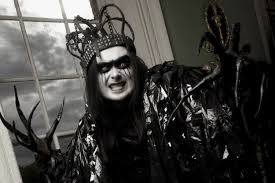 Cradle of Filth – Hammer Of The Witches (working title): In the past few years, the idea of a new Cradle album was met with a sad level of indifference from myself and as it seemed many others. Paul Allender’s role as guitarist was long past its expiration date, heard in recycled riffs and uninspired songwriting. Yet his departure in 2014 was surprising as it was enticing —- with all due respect to Allender, its now transparently obvious that he wanted to move on years before but the relatively steady nature of Cradle’s existence and operations kept him around for years and albums longer. The new guitarists, two guys named Ashok and Richard Shaw (there’s some dichotomy for you) are relatively unknown quantities, but Dani’s recent
Cradle of Filth – Hammer Of The Witches (working title): In the past few years, the idea of a new Cradle album was met with a sad level of indifference from myself and as it seemed many others. Paul Allender’s role as guitarist was long past its expiration date, heard in recycled riffs and uninspired songwriting. Yet his departure in 2014 was surprising as it was enticing —- with all due respect to Allender, its now transparently obvious that he wanted to move on years before but the relatively steady nature of Cradle’s existence and operations kept him around for years and albums longer. The new guitarists, two guys named Ashok and Richard Shaw (there’s some dichotomy for you) are relatively unknown quantities, but Dani’s recent  Dimmu Borgir – TBA: It will likely be just over five long years since the release of Dimmu’s last album, the unfortunately titled but otherwise decent Abrahadabra. I loved the eponymous “Dimmu Borgir” off that album, one of the band’s catchiest singles in years (it had a pretty decent music video too), but the majority of the album made me wonder how much there was possibly left to explore in their heavily symphonic black metal style. I’m not really sure what to expect from these guys now, but it really seems like a stylistic evolution ala Satyricon might be in order. Blut Aus Nord just dropped a new album of classic Norwegian second wave black metal that is bracing, fresh, and revitalized… proving in one fell swoop that there’s still life left in the old traditions. Maybe the way forward for Dimmu is to look back in order to progress their sound. More of the same from them would be disappointing in a way, especially after a five year gap.
Dimmu Borgir – TBA: It will likely be just over five long years since the release of Dimmu’s last album, the unfortunately titled but otherwise decent Abrahadabra. I loved the eponymous “Dimmu Borgir” off that album, one of the band’s catchiest singles in years (it had a pretty decent music video too), but the majority of the album made me wonder how much there was possibly left to explore in their heavily symphonic black metal style. I’m not really sure what to expect from these guys now, but it really seems like a stylistic evolution ala Satyricon might be in order. Blut Aus Nord just dropped a new album of classic Norwegian second wave black metal that is bracing, fresh, and revitalized… proving in one fell swoop that there’s still life left in the old traditions. Maybe the way forward for Dimmu is to look back in order to progress their sound. More of the same from them would be disappointing in a way, especially after a five year gap. Enslaved – In Times: Due in early March, the next Enslaved album is right up there among my most anticipated of 2015, this despite the band’s frustrating lack of Texas tour dates on yet another “North American” tour. That aside, I’m eager to hear what direction these guys veer off into this time. Their last album RIITIIR (a 2012 year end
Enslaved – In Times: Due in early March, the next Enslaved album is right up there among my most anticipated of 2015, this despite the band’s frustrating lack of Texas tour dates on yet another “North American” tour. That aside, I’m eager to hear what direction these guys veer off into this time. Their last album RIITIIR (a 2012 year end  Faith No More – TBA: If the band’s 2014 single “Motherfucker” was any indication, we’re in for a treat. I love the way that song didn’t sound like anything I had ever heard from the band in their 90s heyday, yet still sounded unmistakably like Faith No More in all their ugly, beautiful, and baffling glory. It also put to rest any remote moaning about the lack of Jim Martin’s involvement, as Jon Hudson is as creative and adaptable a guitarist as the band needs (surely his work on Album of the Year should’ve sold people on that). More promising is that the band are recording the new album entirely on their own without the involvement of a record label, and given what they got away with when on a major label, who knows what juxtapositions and bizarreness we’ll get from song-to-song. I’m just so happy to have the band back, their work felt incomplete upon their disbandment in 1998, and there are precious few bands that have the kind of personality that FNM had in spades. Maybe a Metal Pigeon Recommends feature is in order for these guys prior to the album release… something I’ll keep in mind.
Faith No More – TBA: If the band’s 2014 single “Motherfucker” was any indication, we’re in for a treat. I love the way that song didn’t sound like anything I had ever heard from the band in their 90s heyday, yet still sounded unmistakably like Faith No More in all their ugly, beautiful, and baffling glory. It also put to rest any remote moaning about the lack of Jim Martin’s involvement, as Jon Hudson is as creative and adaptable a guitarist as the band needs (surely his work on Album of the Year should’ve sold people on that). More promising is that the band are recording the new album entirely on their own without the involvement of a record label, and given what they got away with when on a major label, who knows what juxtapositions and bizarreness we’ll get from song-to-song. I’m just so happy to have the band back, their work felt incomplete upon their disbandment in 1998, and there are precious few bands that have the kind of personality that FNM had in spades. Maybe a Metal Pigeon Recommends feature is in order for these guys prior to the album release… something I’ll keep in mind.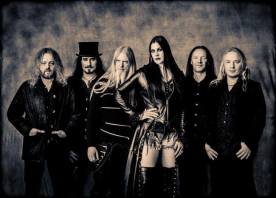 Nightwish – Endless Forms Most Beautiful: Second only to Blind Guardian as my most anticipated album of 2015, I have the highest of hopes for the debut of Floor Jansen as the third Nightwish vocalist. She is perhaps the most adaptable of them all, capable of classical operatics, as well as the wildly versatile pop-rock accessibility of Anette Olzon. Having seen Jansen with the band in concert myself, I thought her most valuable resource as a vocalist was her ability to project power in a way that both Olzon and Tarja were unable to. Simply put, she can belt it out when she wants to, an ability that immediately makes her the metalized equal to Marco Hietala’s soaring, accented tenor. Of course Tuomas Holopainen’s songwriting will be my primary focus of attention, and judging by his choice of song titles, cited inspirational reading, and guest narrator in Richard Dawkins —- we’re in for a thematic album at the very least (something entirely new for the band). Its hard to envision a Nightwish album better than 2011’s Imaginaerum, but here’s to Holopainen giving it his best shot.
Nightwish – Endless Forms Most Beautiful: Second only to Blind Guardian as my most anticipated album of 2015, I have the highest of hopes for the debut of Floor Jansen as the third Nightwish vocalist. She is perhaps the most adaptable of them all, capable of classical operatics, as well as the wildly versatile pop-rock accessibility of Anette Olzon. Having seen Jansen with the band in concert myself, I thought her most valuable resource as a vocalist was her ability to project power in a way that both Olzon and Tarja were unable to. Simply put, she can belt it out when she wants to, an ability that immediately makes her the metalized equal to Marco Hietala’s soaring, accented tenor. Of course Tuomas Holopainen’s songwriting will be my primary focus of attention, and judging by his choice of song titles, cited inspirational reading, and guest narrator in Richard Dawkins —- we’re in for a thematic album at the very least (something entirely new for the band). Its hard to envision a Nightwish album better than 2011’s Imaginaerum, but here’s to Holopainen giving it his best shot. Queensryche – TBA: While Queensryche’s self-titled debut with new vocalist Todd LaTorre was a solid return to form, it had severe flaws. The most glaring of which was song length, most of the cuts on the album hovering in the three to four minute range that could’ve benefited from additional verses or expanded guitar solos. Now with all the legal battle drama behind them, this is Queensryche’s time to truly get back to their progressive metal roots —- especially with their debut at Wacken Open Air (finally!) only eight months away. This is a band that needs to be out there touring with actual modern metal artists, not 80s glam-rock bands, and hopefully their time at Wacken will yield fruit in that regard as well as serve as their re-introduction to the European metal audience as a whole. Oh and getting the album out before that show would be good too.
Queensryche – TBA: While Queensryche’s self-titled debut with new vocalist Todd LaTorre was a solid return to form, it had severe flaws. The most glaring of which was song length, most of the cuts on the album hovering in the three to four minute range that could’ve benefited from additional verses or expanded guitar solos. Now with all the legal battle drama behind them, this is Queensryche’s time to truly get back to their progressive metal roots —- especially with their debut at Wacken Open Air (finally!) only eight months away. This is a band that needs to be out there touring with actual modern metal artists, not 80s glam-rock bands, and hopefully their time at Wacken will yield fruit in that regard as well as serve as their re-introduction to the European metal audience as a whole. Oh and getting the album out before that show would be good too. Savatage at Wacken Open Air: Fifteen years after the last Savatage tour, the band is getting back together for a last hurrah on the biggest stage in the metal universe. Or is it really the last? Chris Caffery recently
Savatage at Wacken Open Air: Fifteen years after the last Savatage tour, the band is getting back together for a last hurrah on the biggest stage in the metal universe. Or is it really the last? Chris Caffery recently 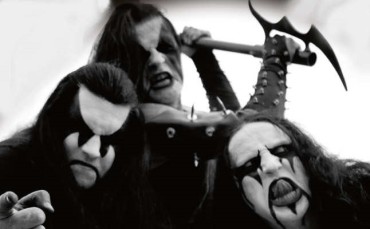 Will Immortal release their new album: I guess I should be asking, is Abbath going to win the rights to the Immortal name so he can release the album that he’s already recorded with other musicians?
Will Immortal release their new album: I guess I should be asking, is Abbath going to win the rights to the Immortal name so he can release the album that he’s already recorded with other musicians? 

 2. Ghost Brigade – IV – One With the Storm:
2. Ghost Brigade – IV – One With the Storm: 3. Dawn of Destiny – F.E.A.R.:
3. Dawn of Destiny – F.E.A.R.:

 6. Primordial – Where Greater Men Have Fallen:
6. Primordial – Where Greater Men Have Fallen: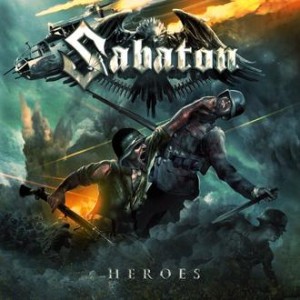 7. Sabaton – Heroes:
7. Sabaton – Heroes:
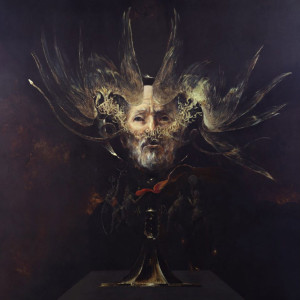 9. Behemoth – The Satanist:
9. Behemoth – The Satanist: 10. Noble Beast – Noble Beast:
10. Noble Beast – Noble Beast: I don’t like to pretend that any of you follow my every move in the world of metal blogging, social media, and related activities. So I’ll safely assume that most of you are unaware that I’ve been co-hosting a metal podcast for a few months now. Its called the MSRcast (named after the long defunct zine Mainstream Resistance) and I join its founder and host Cary G to discuss and debate current events and releases in metal, as well as anything else that’s running through our minds at that moment. MSRcast is going onto its ninth year of existence which might very well make it one of the longest running metal related podcasts out there. In the handful of times I’ve appeared on its episodes throughout this year, first as a guest and finally as an official co-host, the show has undergone a shift in format away from being loaded with music in favor of more discussion and debate. It was a natural progression I think, in that we were trying to keep episode lengths reasonable for podcasts (meaning in the hour and a half-ish range) and we had to make a choice between trimming the amount of songs we played or keeping our chatter to a minimum. Seeing as how the latter would never happen (never!), we decided to cut the amount of songs by half, and to play them one at a time within the flow of our discussions instead of in multi-song blocks.
I don’t like to pretend that any of you follow my every move in the world of metal blogging, social media, and related activities. So I’ll safely assume that most of you are unaware that I’ve been co-hosting a metal podcast for a few months now. Its called the MSRcast (named after the long defunct zine Mainstream Resistance) and I join its founder and host Cary G to discuss and debate current events and releases in metal, as well as anything else that’s running through our minds at that moment. MSRcast is going onto its ninth year of existence which might very well make it one of the longest running metal related podcasts out there. In the handful of times I’ve appeared on its episodes throughout this year, first as a guest and finally as an official co-host, the show has undergone a shift in format away from being loaded with music in favor of more discussion and debate. It was a natural progression I think, in that we were trying to keep episode lengths reasonable for podcasts (meaning in the hour and a half-ish range) and we had to make a choice between trimming the amount of songs we played or keeping our chatter to a minimum. Seeing as how the latter would never happen (never!), we decided to cut the amount of songs by half, and to play them one at a time within the flow of our discussions instead of in multi-song blocks. And finally, in the thrilling(!) conclusion, I present The Metal Pigeon’s Best Albums of 2013, the second and final part of my overall best of the year feature (
And finally, in the thrilling(!) conclusion, I present The Metal Pigeon’s Best Albums of 2013, the second and final part of my overall best of the year feature (
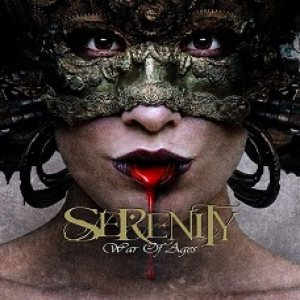 1. Serenity – War of Ages:
1. Serenity – War of Ages: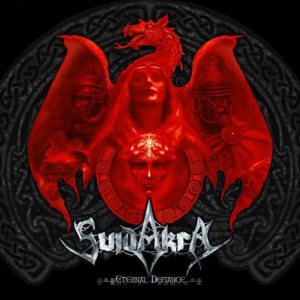 2. Suidakra – Eternal Defiance:
2. Suidakra – Eternal Defiance: 4. Carcass – Surgical Steel:
4. Carcass – Surgical Steel:  5. Falkenbach – Asa:
5. Falkenbach – Asa: 6. Orphaned Land – All Is One:
6. Orphaned Land – All Is One:  7. Rotting Christ – Kata Ton Daimona Eaytoy:
7. Rotting Christ – Kata Ton Daimona Eaytoy: 8. In Solitude – Sister:
8. In Solitude – Sister: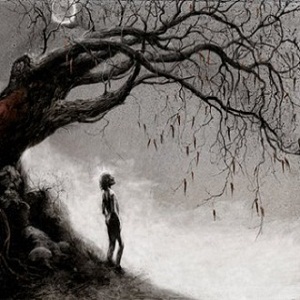 9. October Falls – The Plague of a Coming Age:
9. October Falls – The Plague of a Coming Age:  10. Tribulation – The Formulas of Death:
10. Tribulation – The Formulas of Death:  1. Therion – Les Fleurs Du Mal:
1. Therion – Les Fleurs Du Mal: 2. Pharaoh – Bury the Light:
2. Pharaoh – Bury the Light: 3. Be’lakor – Of Breath and Bone:
3. Be’lakor – Of Breath and Bone: 4. Sabaton – Carolus Rex:
4. Sabaton – Carolus Rex: 5. Barren Earth – The Devil’s Resolve:
5. Barren Earth – The Devil’s Resolve: 6. Anathema – Weather Systems:
6. Anathema – Weather Systems: 7. Kreator – Phantom Antichrist:
7. Kreator – Phantom Antichrist: 8. Dawnbringer – Into the Lair of the Sun God:
8. Dawnbringer – Into the Lair of the Sun God: 9. Enslaved – RIITIIR:
9. Enslaved – RIITIIR: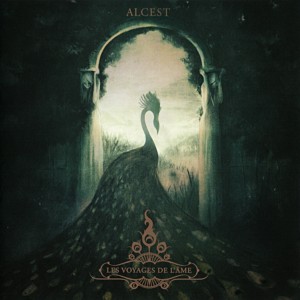 10. Alcest – Les Voyages De L’âme:
10. Alcest – Les Voyages De L’âme: